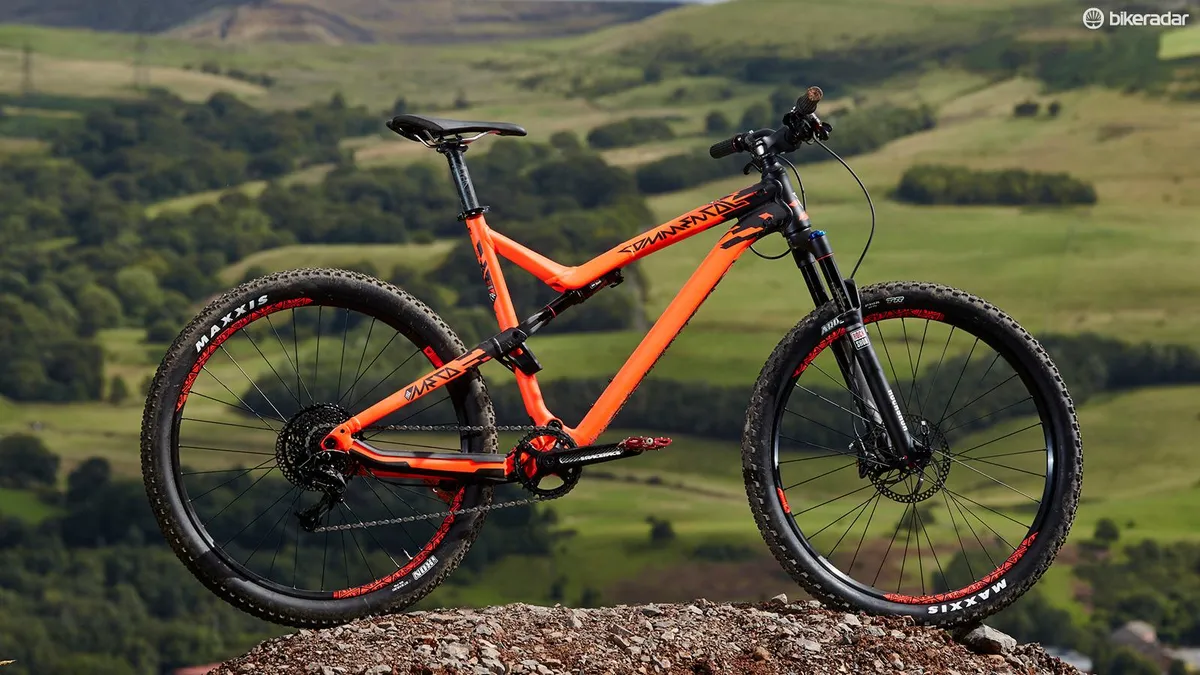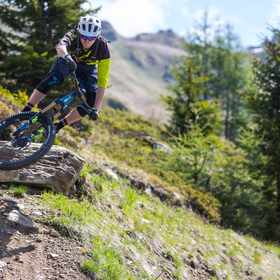Commencal's Meta Trail isn't big on travel, but the Andorran brand has produced a fun and surprisingly capable trail machine nonetheless.
This ‘Essential’ model sits in the middle of the three-bike range and, in terms of spec for money, is the one to go for. On the trail though it’s the playful attitude of the frame, not the equipment, that shines through.
- Highs: Long reach adds comfort and allows for aggressive cornering despite low-profile treads, light weight gives rapid acceleration, efficient suspension helps with climbing and descending
- Lows: Non-dropper post is frustrating; flexy Reba fork is easily overwhelmed
Frame and equipment: stretched-out styles
Commencal has got on board with the long front end philosophy pioneered by Mondraker and this comes across in the ride character of the bike. The frame boasts a lengthy top tube, giving a roomy 483mm reach figure on our XL sample. The broad top tube and hydroformed, triple-butted tubeset boost stiffness, contributing to snappy handling.
A single-pivot swingarm drives a rocker-actuated shock mounted in a recess in the top tube to deliver 120mm (4.7in) of rear travel. This combines a supple action with efficient pedalling response. In order to improve swingarm stiffness there’s no room for a front derailleur, but there are ISCG-05 tabs for a chain guide.

To help maximise swingarm stiffness, it's a single-ring-only affair
The 1x10 transmission is mainly SRAM X9 kit, with a 42t expander sprocket from e*thirteen and a 34t narrow/wide ring to keep the chain on track up front. RockShox’s Monarch RT3 shock does a sterling job, while their Reba RL fork is great on the climbs not ideally suited to rougher stuff.
The Formula CR3 brakes offer ample power once bedded in. The bike deserves a wider bar than the stock 730mm offering, and the 60mm stem could be shorter too. Lightweight wheels and tyres keep acceleration snappy and rolling speed high, but such rapid rubber isn’t much cop in mud.
Ride and handling: very handy all-rounder let down slightly by fork
The short-travel Meta plays its trump card well on the climbs. Sprinting out of the saddle with the fork and shock in open mode, bob isn’t too bad, and both can be locked out or firmed up at the flick of a switch.
Low overall weight (12.86kg/28.35lb) and lightweight wheels make the Meta Trail noticeably sprightly under acceleration, especially when pounding the pedals out of the saddle. The Maxxis Ikon and Ardent treads provide very little rolling resistance, so open sections are dealt with swiftly.
When the climbs get steep and technical the shock can be left open for better comfort and traction without excessive wallow or bob. The seat angle is just steep enough for tough ascents, and the spacious cockpit provides plenty of room to breathe. Even with the cassette expander, the 34t chainring requires some muscling round on longer drags though.

The Meta is a capable descender
Stopping to drop the saddle manually is a tediously nostalgic experience after testing so many bikes with dropper posts. At least the 1x10 setup means the flow of the ride isn’t further disjointed by the need to shift between chainrings, and the relatively efficient suspension helps when pedalling out of the saddle.
The mid-range gearing gap created in order to fit the expander sprocket on the freehub is noticeable on flatter sections, but the jump doesn’t feel as big as you might expect.
The Commencal is a fun machine on the descents. That long reach makes it surprisingly comfy at speed, and the stiff frame provides snappy handling in the bends. We soon had it dancing around at the limits of traction as we tore into corners and berms. They may be designed for speed rather than loose-conditions grip, but the relatively supple Maxxis rubber sticks better than most over hard, wet surfaces.

A 42t e*thirteen expander cog helps with the climbs
The rear suspension performs well too, with the simple shock not being overwhelmed by the 120mm of travel it controls even on prolonged DH runs. It’s quite linear, which helps the bike make the most of its available travel on the terrain for which it was intended. Yes, it’ll bottom out if confronted with big landings, but that's never going to be the forte of a short-travel trail bike.
The main letdown when descending – apart from the non-dropper post – is the Reba fork. It’s not the limited travel; it’s the flexy stanchions. They bend and bind noticeably when confronted with square-edge hits or braking bumps, causing the fork to spike and feel harsh.
This will be less of an issue for lighter riders, so if you can budget for a dropper and want a fast and lively trail razzer, this Meta could be for you.








